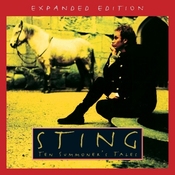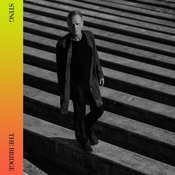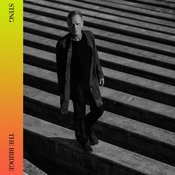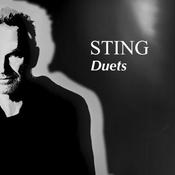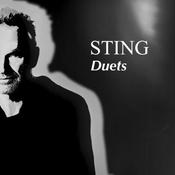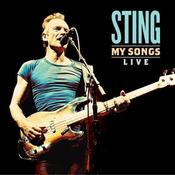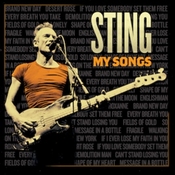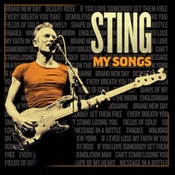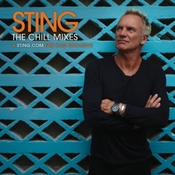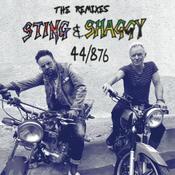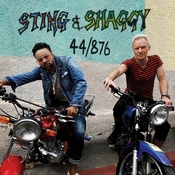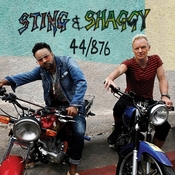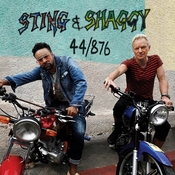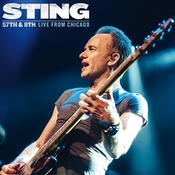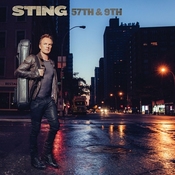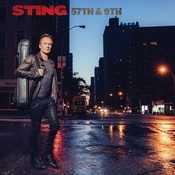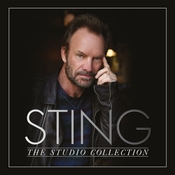...Nothing Like The Sun
- The Lazarus Heart lyrics
- Be Still My Beating Heart lyrics
- Englishman In New York lyrics
- History Will Teach Us Nothing lyrics
- They Dance Alone (Gueca Solo) lyrics
- Fragile lyrics
- We'll Be Together lyrics
- Straight To My Heart lyrics
- Rock Steady lyrics
- Sister Moon lyrics
- Little Wing lyrics
- The Secret Marriage lyrics

Soundbites
"A man needs to accept that part of his psychological make-up is feminine. You mustn't suppress those qualities of creativity, kindness, openness and intuition. Masculine traits are strength, single-mindedness and logic. Without the balance, you end up as Ryan of Hungerford, totally lost. In the past few years, I've had more friends who are women than ever before. I used to see women as sexual conquests, for having your children or massaging your ego. I'm not saying I'm a saint, but I hope I'm moving towards maturity."
Sting, Sky Magazine, 11/87
"It's not a lively record."
Sting, Q, 12/87
"Nothing in life is isolated. Everything's connected. And the timing of my mother's death was linked to a lot of other events. It coincided with a time when this album became free of the machinery. Only now are we pulling it out; it's been hidden in the machinery so long. Which is why people were getting uptight and worrying that there wasn't anything there. I don't have any doubts about this record. Although recording digitally was difficult and kind of alienating, it allowed me more flexibility in terms of arrangement... and that drove me crazy. I could change the key, add whole sections to the song when it was already finished, change the tempo, everything. But basically I knew there was a core in each song that worked that you couldn't destroy."
Sting, Spin, 12/87
"I suppose it's about femininity, the ying instead of the yang, which is a factor in all music. I mean, playing music and singing, writing songs, are definitely activities that are right-brained. It's female it's intuitive, it's gentle, it's not aggressive. Even the most violent punk band can't help but be creative. There's a benign element in all music that you can't hide or you can't disguise very long. Look at an artist like Billy Idol. His whole thing is to be this kind of aggressive, grimacing warrior, if you like. But he has to work very hard now to maintain that because the music is mellowing him. Which is why heavy metal is not very long-lasting for most groups, because when you play music for awhile it matures you in a way that's not aggressive. I'm not saying that music always ends up wimpy. l just think it can make you grow as a person to maturity. And I think that maturity, as Jung says, means accepting the feminine principle, accepting sensitivity into your life as part of you and not as something that's alienating and frightening."
Sting, Spin, 12/87
"Having made some of the simplest and most direct pop music, I don't know whether I want to do it again. But this music, taken to a logical conclusion, can only get more complicated and, maybe, indigestible. In the Seventies, they called it art rock. When this record was first completed and handed to the record company, they threw up their hands. It wasn't simple enough or directed toward the charts. And I said, "Why underestimate the record-buying public Why do you imagine that they have to be spoon-fed all the time Does it have to be so utterly simple I don't think so. Now the record is doing well on the radio and in the shops; the concerts are selling well. It confirms my belief that sophistication, or intended sophistication, is not the kiss of death. As long as you're grounded somewhere in common sense."
Sting, Rolling Stone, 2/88
"'...Nothing Like The Sun' is probably the child of the Synclavier and the ability to slow down the composing instrument so that I can control it. Because of the way the machine worked, I managed to be able to compose things that were far more sophisticated than I would normally have access to. In other words, if you can slow something down you can work it out. So the chords and arrangements were much more complex, and I wouldn't have arrived at that level of ability without the instrument. I also saw it as my job to inspire and challenge the musicians I was working with, because they were musicians of such a caliber that they would not be happy just playing I-IV-V in a harmonic scale. They had to be able to play slightly beyond their abilities, even, so it was my job to interest and energize them. '...Nothing Like The Sun' was about stretching boundaries."
Sting, Billboard, 9/99
"I look back on this album and I realise that the record is about my mother although I didn't see it at the time. It's about mothers and daughters, mistresses and wives, sisters... Every song has one of these themes. It surprised me. I didn't realise it was there. It's all about women."
Sting, Timeout, 10/87
"I don't know what the critics will think of this album. It's rather cold and technical, not very 'up'. Working with digital is weird, all the flaws are exposed, there's no warmth. It's like building a brick wall with no mortar."
Sting, Spin, 12/87
"I know all this is connected with my mother's situation. Until she's...out of pain. Until she dies... I can't really open up and be creative."
Sting, Spin, 12/87
"One night I was walking on Highgate Hill when a drunk accosted me and kept asking, 'How beautiful is the moon' I replied, 'My mistress' eyes are nothing like the sun...' He said that was a good answer, and lurched off. Shakespeare works quite well with drunks, I've found."
Sting, Spin, 12/87
"People might listen to it and wonder, What's he doing I knew I was on the right track when I confused everybody in the studio - they didn't have a clue about what I was trying to get at, which was a real pop record. I wanted a record that is funny, emotional, sad, sexy, danceable and serious. That, to me, is what pop music should be - not this homogeneous record that has one guitar sound and one snare drum sound from start to finish."
Sting, Spin, 12/87
"If we agree that the album is about mourning, then I needed to start it off in this special, joyful way. It's about rebirth, hopefully. I didn't want to just cry in my beer, do this moaning record about how awful life and death are. I wanted to say that, yes, we have to face death and there is a way to do it that isn't just moaning. We have to rejoice, in a way. It's a victory song. That's the way my mother was. That's what she gave to me when I said goodbye to her. It was her incredible sense of humour and her sense that all was not lost. She was joking and she was loving. She gave me such an example of courage that I had no choice but to rejoice. That's why the record is happy. It's not a mournful record; it's an up record."
Rolling Stone, 2/88
"'...Nothing Like The Sun' didn't start out to be an album about anything. I came up with these 10 or 12 songs and it was only later that I realised a lot of the songs were about women, but not just women as romantic objects, but women as advisers, women as companions, as mothers. sisters. It was a very therapeutic record for me to make. I mean my mother had just died, and I suppose I was obsessed by the idea of females and how was I going to replace her."
Sting, All This Time CDRom, '95
"There was a variety of styles and feelings on '...Nothing Like The Sun', but it was an album essentially about women, or the women in my life, whether they were lovers or wives or mothers."
Sting, Billboard, 9/99
Backgrounder
Review from Rolling Stone magazine
A powerful, often hypnotic album that blends jazz and rock styles into a thoughtful suite of twelve songs about love, politics and the meaning of the individual life - avoids the self-conscious stiffness that marred Sting's first solo LP, 'The Dream of the Blue Turtles'. Whereas that album often seemed to be merely the sterile enactment of its fusion-jazz ambitions, '...Nothing Like the Sun' flows naturally.
The album's title comes from a sonnet by Shakespeare that begins with the line "My mistress's eyes are nothing like the sun." Against the extravagant imagery of much Elizabethan love poetry, that sonnet articulates a human-scale vision of love for a flesh-and-blood woman, who far from standing on a pedestal, "treads on the ground." Similarly, on '...Nothing Like The Sun', Sting resists, for the most part, his tendency to drift into the mystic. Instead he locates the LP's songs in an uneasy three-dimensional world of unruly emotions ('Be Still My Beating Heart', 'Sister Moon'), nightmarish social systems ('History Will Teach Us Nothing', 'They Dance Alone') and personal commitment ('The Secret Marriage').
Sting dedicates '...Nothing Like The Sun' to his mother, who died recently at fifty-three, and the songs about women on the record seem informed by the mother-son bond and the double-edged impact of its breaking at birth, marriage and death. 'The Lazarus Heart', the album's shimmering opening track, weds Freud and 'The Golden Bough' in its mythic dream of an artist whose creativity derives from a wound inflicted by his mother. The Chilean women in the stately 'They Dance Alone' dance in mournful celebration of their husbands, sons and fathers, who were jailed or killed by the Pinochet regime.
For his band on '...Nothing Like The Sun', Sting has carried over saxophonist Branford Marsalis and keyboardist Kenny Kirkland from the jazz outfit that backed him on 'The Dream of the Blue Turtles'. He plays bass himself and has recruited drummer Manu Katche, percussionist Mino Cinelu and a host of guest stars (including Andy Summers, Eric Clapton and Mark Knopfler). The arrangements are airily layered, with instruments and rhythms constantly doubling and counterpointing each other but never becoming so dense as to be stifling. Lively percussive currents keep songs like 'Straight to My Heart' and 'Rock Steady' moving along briskly.
The instrumental textures and introspective tone of the album preclude any explosive soloing or improvisation; that is something of a shame given the presence of players of the calibre of Marsalis and Kirkland. One of the more appealing surprises on the record, however, is guitarist Hiram Bullock's lyrical soar during a startling cover of Jimi Hendrix's Little Wing. Gil Evans and his orchestra provide the perfect atmospheric setting for Sting's eerie meditation on Hendrix's surreally poetic love song.
'...Nothing Like The Sun' is also one of those records that help define a point of technological transition. Simply stated, it must be heard on a compact disc - or, as a very distant second choice, on cassette. At fifty-four minutes, it's too long for a single vinyl album, and spread thinly over four sides, it breaks too often and abruptly to sustain its otherwise consistent mood. The CD version also allows a greater appreciation of the record's choice sonic details.
In any configuration, however, '...Nothing Like The Sun' represents impressive growth for Sting. His voice is rich, grainy and more mature; his ideas are gaining in complexity; and musically he is stretching without straining. His mistress's eyes may be nothing like the sun, but on this fine new album Sting's intrepid talent shines on brightly.
Review from Q magazine by Dave Rimmer
Without freedom from the past, sings a typically philosophical Sting on one track called 'History Will Teach Us Nothing', things will only get worse.
This may be true. Buckminster Fuller has, according to the sleeve notes, said so too. But in the fact of 1985's 'Dream Of The Blue Turtles' (A&M), history has certainly taught us that freedom from the pop past of The Police allows a more versatile and sophisticated, less obviously cynical Sting. Finally finished with all the silly voices and dippy white reggae jogging rhythms, freed of the bass-drums-guitar format and adding a jazz inflection to his work, the star in Sting was beginning to shine in a new kind of way. And on the evidence of this second solo studio LP - a double, no less - it seems that Sting will only get better.
Though brilliant in places, 'Dream Of The Blue Turtles' (A&M) was a patchy collection. On 'Nothing Like The Sun', musical Sting seems to have solved most of his stylistic difficulties. It's a much more even textured album. Where different styles stick out-as during the musical tour of Manhattan on the affectionate 'Englishman In New York' - it is because they are meant to. Among the musicians credited here are Kenny Kirkland and Branford Marsalis (again); Eric Clapton, Andy Summers, Mark Knopfler and Hiram Bullock variously on guitar (this time Sting sticks mostly to bass), Gil Evans and his orchestra on an enjoyable version of Jimi Hendrix's 'Little Wing', and Ruben Blades doing a Spanish talkover in the moving 'They Dance Alone'.
Needless to say, then, the playing is impeccable throughout. But that's not the point. Sting can now juxtapose pieces as various as a piece of sweaty, thumping R&B ('We'll Be Together' - the album's sequel to 'If You Love Somebody Set Them Free'), an updated tongue-in-cheek version of the story of Noah's Ark set to a piece of jazz sleaze ('Rock Steady'), and a song based around a mournful melody from German composer and Bertolt Brecht collaborator Hans Eisler (The Secret Marriage), and still make it all sound shamelessly, seamlessly Sting.
Lyrical Sting meanwhile still spends a lot of time singing about love, mostly in songs that have the word heart in the title - 'The Lazarus Heart', 'Be Still My Beating Heart'. Best of this bunch is 'Straight To My Heart', a simple fresh-sounding song built around what feels like a flamenco-derived rhythm.
After love, Sting's next favourite subject is death, in various guises. The best part of this album is side two, on which concerned Sting first takes a tragic view of history in 'History Will Teach Us Nothing', then sings about torture and the disappeared in Chile on 'They Dance Alone' (a song that also refers to his own mother, recently deceased, to whom the album is dedicated) and finishes with 'Fragile', a hymn to mortality apparently inspired by a friend of Sting's being murdered by the Nicaraguan Contras. On the second or third play, this reviewer found that sequence reducing him to tears.
It's a measure of what makes solo Sting special that after so many years in the hype machine, living a lifestyle based on god only knows what riches in the bank, he has finally found the will and the voice to sing simply and affectingly about political subjects like the arms race, the miner's strike or torture in Chile - a country to which, as part of The Police, he once actually paid an official visit.
At heart, he's clearly just another northern romantic. Idealist Sting counterposes political tragedy against the consolation of love, still tempering both sides of the equation with a vague mysticism. These songs are sensitive, literate, intelligent, thoughtful, moving and occasionally very funny too. There aren't too many stars who can manage all that and we should value Sting for it.
Review from The Washington Post by Richard Harrington
On his second solo album, 'Nothing Like the Sun' former Police frontman Sting has stepped back from the stylistic liberation offered by 1985's 'Dream of the Blue Turtles', his coalition with several young lions of jazz, including saxophonist Branford Marsalis and keyboardist Kenny Kirkland. Drummer Omar Hakim has been replaced by Senegal's Manu Katche and percussionist Mino Cinclo from Martinique, but the visceral pop/bop synthesis has been subdued, though Marsalis' liquid fills and supple ornamentation are still evocative.
Sting has chosen to issue this 12-song, 54-minute collection on two records (one tape or CD), the theory being that uncluttered grooves have more breathing room, thus giving the record a deeper dimensionality. Sonically, it's a good decision, but it still comes down to the music, and 'Nothing Like the Sun' contains four powerful songs, one per-funk-tory accommodation to commercial radio and seven songs that sound better than they are.
The best song, and one of Sting's finest compositions ever, is 'They Dance Alone (Gueca Solo)', inspired by last year's Conspiracy of Hope tour for Amnesty International, where the participating musicians interacted with former political prisoners. That hands-on, hearts-out experience led to a moving song about the families of los desaparecidos, Chile's "disappeared." While a wistful Andean flute line (synthesized) floats above a dragged-out martial cadence, the singer describes women silently enacting a traditional courtship dance with pinned-on pictures of their husbands, sons and fathers, all under the cold stares of the army.
"It's the only form of protest they're allowed/I've seen their silent faces scream so loud/If they were to speak these words/they'd go missing too."
The languid melody is haunting, Marsalis' fills ache, and both Sting's singing and his compassionate lyrics evoke the agony of separation even as they suggest some ultimate triumph: "One day we'll dance on their graves/One day we'll sing our freedom/One day we'll laugh in our joy/And we'll dance." The song ends with an accelerating rhythmic pulse, as if that day is not too distant.
'They Dance Alone' is not the only political song on the album. There's the informed but somewhat didactic 'History Will Teach Us Nothing', a pop-modified reggae number in which Sting sounds like the teacher he once was, and 'Fragile', a beautiful homage to Benjamin Linder, the American engineer killed earlier this year in Nicaragua by the contras. The latter song, on which Sting plays acoustic guitar, has a shimmering, neo-Brazilian pulse in the manner of Jao Gilberto and Milton Nascimento, and his singing has that feel as well as the soft focus of Nick Drake.
The other two standout cuts are not original. Sting's reading of Jimi Hendrix's 'Little Wing' is more wistful, but transcendent nonetheless. Neither his probing vocal, nor Hiram Bullock's sensational but thankfully nonmimicking guitar solo, nor Marsalis' soprano excursions evidence anything other than genuine respect for the source, making it a searing but not an exorcising experience (though one wonders what happened to Gil Evans and his orchestra, barely audible). The other notable song is 'The Secret Marriage', a haunting deconstruction of the marriage contract based on a melody by Hanns Eisler, a colleague of Bertolt Brecht's in pre-Nazi Germany. Probably an offshoot of Sting's participation in the Brecht-Weill 'Lost in the Stars' project, it could easily fit into a corner of 'Cabaret'.
The rest of 'Nothing Like the Sun' confirms Sting's sensitivity to intra and extrafamilial relationships through lyrics couched in more familiar musical settings. The opening cut, 'The Lazarus Heart', is Sting's moving homage to his mother, who died while the record was being made, and is full of vivid imagery drawn from the dream journal that the current People magazine suggests is his constant bedside companion. 'Straight to My Heart' is an exuberant and word-witty celebration of love's power. 'Be Still My Beating Heart' is elegant cool masking the disquieting confusion attendant to matters of said heart. All sound like percussively terse Police cuts.
Other cuts are 'Englishman in New York', a slight celebration of Quentin Crisp; 'Rock Steady', Noah's tale told with Mose Allison panache; 'We'll Be Together', a slice of funk that never gets warmed up; and 'Sister Moon', a mood piece on the redemption of woman-love graced by Marsalis' embellishments.
'Nothing Like the Sun' is a much more serene, thoughtful effort than 'Blue Turtles', its subdued hues and the absence of any hook-laden or rhythmically compulsive selections forcing greater attention to the lyrics. There are some name guests, including Eric Clapton, Mark Knopfler and Police-mate Andy Summers, but they never intrude or really make their presence felt. There's a lot of complex rhythmic current, some of it dense as underbrush, but the focus is clearly on the songs. Like Bruce Springsteen's 'Tunnel of Love',' 'Nothing Like the Sun' is a self-portrait of a popular artist seeking a musical and moral balance while confounding commercial expectations. That takes some getting used to, but it's also worth the investigation.
Review from The Arizona Republic by Divinia Infusino
It was downright odd to hear Sting's new solo album, '...Nothing Like the Sun' for the first time. Where's the single Where's Sting's indomitable pop sense
Sting's first solo album, 'The Dream of the Blue Turtles', was touted as an experiment, and in some ways it was. For the first time, Sting was recording without his band, the Police. Instead, he organized a group of young New York jazz players, including Branford Marsalis on saxophone. But while 'The Dream of the Blue Turtles' veered from Sting's usual songwriting formulas, it held tight to the rules of the marketplace. Many of the songs were hummable, and immediately engaging, shaped into tight pop nuggets that radio could not refuse.
Not so with '...Nothing Like the Sun'. Rather than punching up the hits, the album drifts into the mind and settles slowly. The jazzy elements are intact, bits of Eastern musical sounds and polyrhythms are evident also.
But '...Nothing Like the Sun', does not beg to be analyzed as much as absorbed. Its hallmark is understatement, a real progression for a guy who once wrote songs according to a strict reggae-verse, pop-melody construction. Lyrically, too, Sting has advanced. Rather than the obvious statement made on 'Russians', on the first record, the new album extends a more evocative political image with 'They Dance Alone'.
In seven minutes of delicate sounds and an eerie melody, the song describes the mourning ritual of Chilean women for their dead husbands, fathers and sons. Undoubtedly the song reflects Sting's participation in the Amnesty International tour two years ago.
Other songs indicate a change - or, more precisely, a softening - of heart for Sting. The man who sang the praises of the strong independent soul, ('If You Love Somebody') now muses ''How fragile we are.'' He speaks of relationships as safety nets for sanity on 'Sister Moon', and he sends out messages of love and devotion on 'The Secret Marriage' and 'We'll Be Together'. The latter is the album's first single. And a catchy one. The video debuted on MTV Wednesday.
But Sting feels secure enough for emotional commitment and vulnerability in his lyrics. And some real risk in his music. '...Nothing Like the Sun', is not the result of Sting's ego wrenching itself from the Police, or the outpourings of his analytical mind.
Sting has some deep-seated emotions to express this time, and he does so beautifully.
Review from USA Today by Anne Ayers
'Nothing Like The Sun' is an uneven, sometimes splendid second solo LP that isn't love-at-first-listen.
Sting's penchant for didactic political lyrics ('History Will Teach Us Nothing') and obscure philosophising ('Sister Moon') is still apparent, though less than on 1985's 'Dream of the Blue Turtles'. And the first single, the funked-up, radio-oriented 'We'll Be Together', sounds like false advertising for the other 11 songs.
But these 59 minutes of music eventually reveal gems, both instrumental and lyric. Two of Turtle's top notch jazzmen reappear - Kenny Kirkland on keyboards and Branford Marsalis on sax - joined by Mino Cinelu, who adds inspired percussion.
The standout track, 'They Dance Alone', is a stately, moving paean to the women who mourn Chile's "disappeared". And there's a lovely cover version of Jimi Hendrix's 'Little Wing' with a great guitar solo by Hiram Bullock. Sting himself plays mesmerising acoustic guitar on 'Fragile'. Other treats: 'Rock Steady', a bopping update of the Noah's ark story, and 'Straight to My Heart' a sci-fi vision of future romance, filled with wordplay.
Review from The Miami Herald by Tom Moon
So now we know: Crossing Shakespeare with a British rock star's crude approximation of Miles Davis just doesn't work. This insight comes from the work of Gordon Sumner, better known as Sting, who continues his role as cultural ambassador to pop music with 'Nothing Like the Sun', the recent digitally recorded, two-LP/ one-CD work.
Here, he quotes Shakespeare's Sonnet 130. There, he tosses up a Schubertian theme by Hans Eisler. One minute, he begs the band for blue notes. The next, he employs a full string section to pluck out - in stiff music-hall style - the reggae backbeat of 'Englishman in New York'. Most of the time he gets away with this kitchen-sink music making. Sting is, after all, one of the most adventurous souls left in pop music. But repeated listening reveals a disturbing thinness in his world-music stew.
Hear 'Fragile' once, and it's Sting doing a light, wind-blown bossa nova. On and on the rain will fall, like tears from a star, he sings. A few more spins around the block, and Sting can be seen standing in the shadows of Brazilian music masters Antonio Carlos Jobim and Milton Nascimento, trying to get the melancholy right. When he sings, in a tone that is surprisingly breathy, he communicates only the dislocation of a baffled alien, an alien singing studiously perfect cadences.
The measure of calculation evident on Fragile exists to some degree on each of the 12 tracks. 'Nothing Like the Sun' is nothing like run-of-the-mill pop. It is also a significant drop in quality from the plateau on which Sting, now 36, has been operating since the breakup of his old band, the Police.
Clearly, this songwriter's experience in the world of improvised music has changed him forever. Before the tour for 'The Dream of the Blue Turtles' last year, Sting orchestrated every moment of his songs as if from a blueprint. Working with saxophonist Branford Marsalis, keyboardist Kenny Kirkland and other jazz musicians on the road, he learned to leave space, to alter the plans. The extended selections on the live LP 'Bring on the Night' showed him - and many in his audience - just how alive a once-rigid pop song can be. Now back in the studio, Sting has worked the "less is more" axiom to an extreme. He has stopped trying to save the world, or draw grand connections between its events. His sights are lower, his songs smaller and more inward-looking. He has focused the telescope. To the jazz players, this means the environment for interplay is much improved.
But the results are mixed: On open-road jaunts like the cooing 'Be Still My Beating Heart', Kirkland unfurls boogie and blues-influenced lines as a reflexive, natural-sounding counterpoint to the vocals. Marsalis gets room to stretch on Little Wing, delivering a brainy, only slightly bluesy solo he probably wishes he could do again. With the chorale-vocal 'The Lazarus Heart', Sting tries too hard to re-create that concert-setting spontaneity, ending up with a moment of darting soprano saxophone followed by an ensemble section that's about as ad-libbed as a presidential address. It's stiff. It's Sting-jazz. It doesn't swing.
In contrast to the live album, where everybody on stage weighed into every backbeat, Sting misuses his musicians here: On the delightfully sombre 'They Dance Alone', the album's overt protest song, Sting tells the tale of the Chilean disappeared with guitarists Mark Knopfler and Eric Clapton so far in the background, they're indistinguishable. The same problem plagues Gil Evans and his orchestra on Jimi Hendrix's 'Little Wing'. They're credited, but invisible. Were it not for Hiram Bullock's tortured taffy-pull of a 'Little Wing' guitar solo, there would be no impression of a personnel change at all.
There's more. The minute Sting decided to write songs geared toward playing, it seems, he put down the pen that brought so many innovations. Sting's Police output endures because it is universal stuff wrapped in harmonic freshness and articulated through unusual chant phrases. That muse is on vacation here, as the songs follow two lines of approach: The simple one-chord vamp tune, and the lush harmonic motion of jazz standards such as Autumn Leaves - best represented on selections like 'Fragile' and 'Sister Moon'.
In the one-chord category, 'We'll Be Together' is the most insulting. Sting has always made reference to past hits; here he conveniently clones. There's nothing but a shout's worth of difference between this song and 'If You Love Someone (Set Them Free)', as though Sting, realising the need for a hit, simply served up what worked so well last time. 'We'll Be Together' is out of place in the Brecht-Weill theater-in-song atmosphere Sting is trying to create, a generic single shoehorned in for obvious reasons.
The most inventively reworked blast from the past happens on 'History Will Teach Us Nothing', or 'Driven to Tears II,' which sports an instrumental melody lifted from Miles Davis' 'Tutu' LP. Its cry - "Sooner or later" - manages to reinforce the enumerated despair of the verses, while the closing double-time chant - "Know your human rights, be what you come here for" - ends the song on an optimistic, if not downright inspirational, note. Once a mad scientist in the laboratory of his musical dreams, songwriter Sting has settled down, become deliberate. The songs are more pedestrian. The performances are somewhat muffled.
At least Sting the vocalist has a good run: On the odd-meter 'Straight to My Heart', the voice sails, smug and triumphant, over choppy waters created by the instruments behind it. On 'Secret Marriage', his poised pipes ring only slightly, as if controlled by a schooled opera singer. 'Be Still My Beating Heart' reunites the sinewy side of Sting with alter-ego Police guitarist Andy Summers, whose now slicing, now harrowingly atmospheric guitar lead-lines outline the singer's blues connotation effortlessly. The simplicity of this track and the pointed 'History Will Teach Us Nothing' demonstrate the irony that prevents 'Nothing Like The Sun' from being a complete success: Since his 'Da Do Do Do' days, Sting has learned to take chances with his music. He brings new wisdom to his lyrics. But all these options have created a stylistic clutter from which his eloquence must struggle to escape.
Review from The Akron Beacon Journal by Chris Willman
In the past, even Sting's biggest fans might have occasionally supposed that they were the ones getting stung, emotionally speaking. Even as concerted an effort to warm him up image-wise as the 'Bring on the Night' documentary film only served to further the suspicion that underneath the man's cool exterior lay, well, a cool interior.
His second solo studio album, '...Nothing Like the Sun', however, burns with real emotion, though its musical veneer is once again quite cool, as in jazz cool (more mellow even than the first album, in fact). Three of the 12 song titles include the word 'heart,' and though you want to dock points when someone has the nerve to title a tune 'Be Still My Beating Heart', you cannot. It sounds like Sting actually has one (a heart, that is), full of romantic fear and trepidations, no less.
And there are again no points to dock when Sting predictably pulls out his Amnesty International stripes for 'They Dance Alone', a moving companion piece to U2's 'Mothers of the Disappeared' in which he describes the loved ones left behind by the imprisoned or dead dancing solo in protest and grief - a symbol good enough to be a metaphor, but actually a practice in Chile, the song's setting. The following cut, 'Fragile', best brings together the album's romantic and topical tensions for an only human statement of faith.
Branford Marsalis (sax) and Kenny Kirkland (keyboards) are the key musical links between the last album and this one. With compelling jazzy-funky grooves that are insistently low-key and obsessive, '...Nothing Like the Sun' lives up, in a way, to its Shakespeare-derived title - it is noir through and through, but a curiously warm noir. Here in Sting's shadowland, the heat is finally, palpably on.
Review from The Milwaukee Journal by Thor Christensen
When Sting broke away from the Police two years ago, it led to the end of one of the great commercial rock bands of the last 10 years. But the Police's demise was not all for naught.
Working with a bunch of young jazz instrumentalists, Sting produced a stunning collection of modern jazz and rock with his 1985 solo debut, 'The Dream Of the Blue Turtles'. When that LP became a unanimous commercial success, the singer-bassist made his temporary hiatus from the Police permanent. Earlier this year, the trio officially disbanded.
On 'Nothing Like The Sun', Sting's second solo LP, he continues to explore and conquer musical terrain that the Police barely knew existed. Though not as immediately striking as 'The Dream Of The Blue Turtles', the record is a testament to Sting's growing stature as one of pop music's most provocative artists.
Many of the musicians who backed Sting on his solo debut are present here, saxophonist Branford Marsalis, keyboardist Kenny Kirkland and vocalists Janice Pendarvis and Dolette McDonald, among them. It's anyone's guess whether Sting could work the same magic without such stellar backing musicians - especially Marsalis who gives several songs their eeriness via his magnificent, flute-like soprano sax.
Yet there is never any doubt that Sting is steering the music. As a lyricist, he does a commanding job walking between subjects as far removed from lunacy, the families of political martyrs in Chile and the state of love in the year 2087. As a singer, he is almost as versatile lending a lusty torch voice to his jazz standards, then squeezing soul out of his icy, English mantra for the album R&B tracks.
But it is Sting's skills as a musical composer that makes 'Nothing Like The Sun' such a joy. In 'The Dream Of The Blue Turtles', he brought in a half a dozen shades of jazz; here he expands on that LP's approach, calling on Latin influences when the song's topic turns to Central and South America, and constructing bold, funk-rock workouts out of his jazz influences.
One of the album's most stirring tracks, however, is its quietest. In the tune called 'Secret Marriage', Sting takes a song by German composer Hans Eisler and strips it down to an intimate core of piano, vocals and bass.
With the Police, Sting and company came up with a truly amazing blend of reggae, punk and pop-rock. Though Sting's tastes as a solo artist run more toward the esoteric. 'Nothing Like The Sun' is every bit as arresting as his Police records.
Review from Playboy magazine by Charles M Young
Sting has never hesitated to take on the big issues - nor has he been reluctant to take on the small issues. '...Nothing Like the Sun' is well within the Sting tradition, dealing as it does with everything from international politics to very personal nightmares. The title is taken from a sonnet ("My mistress eyes are...") in which Shakespeare expresses love for his significant other despite or because of her flaws, and Sting throughout this two record set wrestles with his own feelings toward females. Typically, the pop single 'We'll Be Together' is the least interesting. But be not put off by what you first hear. The best stuff is too long, too thoughtful and often too mournful for most radio formats - 'They Dance Alone' concernss the widows and mothers of murdered political prisoners in Chile. Nonformatted jazz and rock fans, however, should find much to their liking here.
Review from The St. Petersburg Times by David Okamato
Now that a Police reunion appears out of the question, we're just going to have to accept Sting on his own, restless terms. The lean and hungry sound is gone: No more snapping Stewart Copeland snare; forget Andy Summer's atmospheric guitar; vocally, Sting shouts for the heavens no longer.
But as much as the passing of the Police is lamentable, Sting has found a new, more sophisticated sound that is well realized on his new double LP/single CD and cassette '...Nothing Like the Sun'. Unlike 1985's 'The Dream of the Blue Turtles' - in which the moonlighting cop enlisted the aid of four young jazzmen - the new album does not sound like a sociology project. For the most part, it's cool pop-rock with a jazzy tinge. Sax man Branford Marsalis and keyboardist Kenny Kirkland, holdovers from 'Blue Turtles', are used more effectively this time around. Marsalis' coy soprano work provides the album's improvisational backbone.
Although not remotely as driving as the Police, Sting's new direction is still uncluttered and spacious. 'History Will Teach Us Nothing', with its reggae groove, has a decidedly Police-like chorus, but the song is considerably more restrained. Plaintive organ-synthesizer, scratchy rhythm guitar and clattering percussion provide the framework. Relentless abandon has been replaced by a more controlled artistry.
The album's centerpiece is the moving ballad, 'They Dance Alone (Gueca Solo)'. The long track features a simple, elegant melody that simmers along toward a breezy, samba-style instrumental finale. It tells of the wives, daughters and mothers of men killed by the Pinochet regime in Chile - they dance alone in the streets with pictures of their loved ones pinned to their clothes. Sting sings: "It's the only form of protest they're allowed/I've seen their faces scream so loud/If they were to speak these words/ They'd go missing too."
Sting takes a shot at dance-funk on the album's first single 'We'll Be Together', and it proves to be the weakest track. The cracking drum-machine, a repetitive backing vocal part and a flimsy, beaten-to-death hook combine for a forced shot at urban dance music.
There are, however, far more hits than misses. 'Straight to My Heart' is brisk and snappy; 'Be Still My Beating Heart' is moody and haunting; 'Rock Steady', a glib hipster version of the Noah's Ark tale, is a shuffle with some smooth, jazzy vocals; the ballad Sister Moon showcases a superbly crafted melody and some floaty synthesizer swells.
Another highlight is Sting's version of Jimi Hendrix's 'Little Wing', which features jazz icon Gil Evans' orchestra in a low-key role and guitarist Hiram Bullock's hot, high-profile leads pitted against Marsalis' graceful solo. Sting's voice is more conscious of nuance than blow-'em-down bombast. His singing is that way on most of the album.
Perhaps a touch more vocal energy on '...Nothing Like the Sun' wouldn't have hurt, but - song for song - this is pop music of the highest order.










